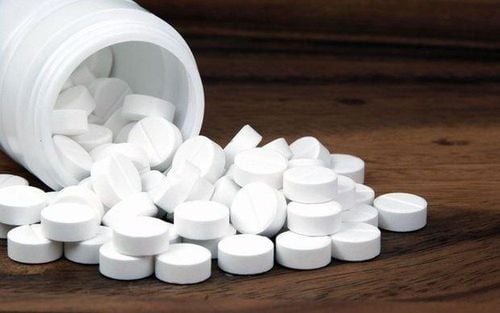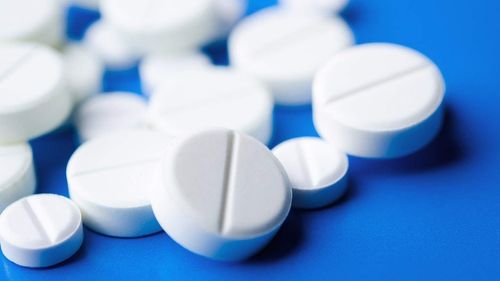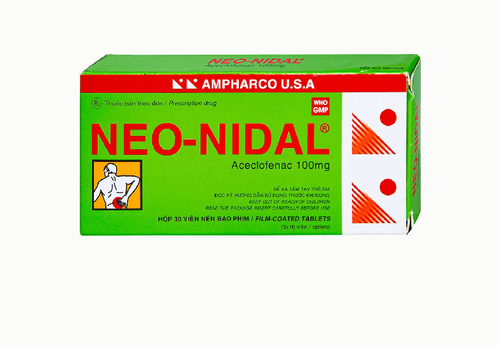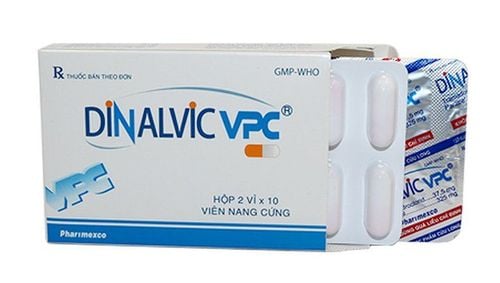This is an automatically translated article.
Philipacol is a combination prescription medicine used to relieve symptoms caused by colds, flu, and sinusitis in children over 12 years of age and adults.
1. What does Philipacol do?
Ingredients in each soft capsule of the drug Philipacol include:
Acetaminophen 325mg: Paracetamol or Acetaminophen: This is a pain reliever, antipyretic drug of the non-steroidal anti-inflammatory drug group. Used to reduce fever and relieve pain caused by diseases such as sore throat, cold, tonsillitis, flu... has the same effect as aspirin but the drug has no anti-inflammatory effect and affects platelet aggregation. . Paracetamol only lowers body temperature in febrile patients, rarely hypothermia in normal people. Dextromethorphan HBr 10mg: This is an antitussive drug, similar in nature to morphine, but without analgesic and sedative effects. The drug has an inhibitory effect on the cough reflex by inhibiting the cough center. Commonly used in dry cough, irritant cough and chronic dry cough. Chlorpheniramine maleate 2mg: This is an antihistamine, which works to relieve symptoms caused by allergies such as sneezing, runny nose, itchy nose and antihistamines are also used to relieve dry cough, cough caused by irritation. Phenylephrine HCI 5mg: This is a sympathomimetic agent due to direct stimulation of alpha receptors, thereby causing vasoconstriction and hypertension, reducing nasal congestion and reducing edema of the nasal sphincter. signs of stuffy nose. Excipients include: Polyethylene glycol 400, Polyethylene glycol 600, Povidon, Gelatin, Concentrated Glycerin, D-sorbitol, Blue No. 1, Red No. 40, Ethyl vanillin and Purified Water). With these active ingredients combined, Philipacol is often used to relieve symptoms of respiratory diseases.
2. Indications and contraindications of the drug Philipacol
2.1.Indications Philipacol is used to relieve flu symptoms such as headache, sore throat, muscle aches, joint pain, fever accompanied by cough, sneezing, stuffy nose, runny nose; sinusitis...
2.2.Contraindications Philipacol is contraindicated in the following cases:
Patient has a history of hypersensitivity to any ingredient of the drug. Children under 12 years old. Acute respiratory failure, hypertension, severe coronary artery disease, severe liver disease or impaired liver function, acute asthma attack, symptoms of prostate enlargement, narrow-angle glaucoma, bladder neck obstruction, gastric ulcer stricture, pyloro-duodenal obstruction. Are taking or have taken a monoamine oxidase inhibitor (MAOI) within the past 14 days. Patients often have anemia, deficiency of G6PD enzyme. Women are breastfeeding.
3. How to use and dose Philipacol
How to use: The drug is made in capsule form, so it should be taken orally, the patient can take it at any time without regard to food. Patients should pay attention, each time taking at least 4 to 6 hours apart.
Dosage:
Adults and children > 12 years old: Take 2 tablets / time, should be taken before going to bed, because Chlorpheniramine has a mild sedative effect. Patients should pay attention not to take more than 06 tablets every 24 hours. Elderly people > 65 years old: need to use the drug under the direction of a doctor. Overdose: When using the drug in high doses, prolonged use or a combination of other drugs with similar ingredients can cause overdose, especially in people with impaired liver and kidney function. Accordingly, the overdose can cause manifestations such as restlessness, change in heart rate, loss of appetite, fatigue, severe jaundice... can cause acute liver failure and hepatocellular necrosis. Relatives should take the patient to a medical facility immediately if using Philipacol overdosage or showing signs of a dangerous overdose.
4. Undesirable effects of the drug Philipacol
Side effects you may experience while taking Philipacol include:
Common side effects such as restlessness, anxiety, skin rash or hives; Sedative effects vary widely from person to person from mild drowsiness to deep sleep, dry mouth and possible irritation occurring with intermittent treatment. Uncommon: Nausea, feeling of dizziness, increased blood pressure, pulmonary edema, arrhythmia, bradycardia, peripheral vasoconstriction, visceral vasoconstriction, risk of respiratory depression, delusional hallucinations, blurred vision desert. Rare: Focal myocarditis, subpericardial hemorrhage, gastrointestinal disturbances such as diarrhea or dyspepsia, odd behavior due to drug poisoning; central nervous system depression; severe allergic reactions, serious skin reactions may occur that the patient should be alerted to such as Steven-Johnson syndrome (SJS) or toxic skin necrosis syndrome (TEN) or Lyell's syndrome...; hematopoietic dysfunction. In case of repeated taking with large doses of drugs containing acetaminophen or taking long-term drugs, there is a risk of hepatocellular necrosis hepatitis. Patients should immediately notify their doctor or pharmacist if they experience unwanted effects when taking the drug for advice and treatment.
5. Notes when using the drug Philipacol
Do not exceed the recommended dose or use it for a long time without consulting a doctor. This is a prescription drug, the patient should only use it when indicated and before using it, it is necessary to inform the doctor about the history of allergies or other medical conditions.
This is a symptomatic treatment, if during treatment, the patient finds a severe sore throat, more pain, lasts more than 2 days, accompanied by fever, severe headache, rash, nausea, vomiting , ... should stop the drug and go to the doctor. If the patient's symptoms do not improve well within 7 days of taking the medicine or get worse, also consult a doctor.
Use caution in the elderly, pregnant and lactating women. Patients need to take medication as directed and only when absolutely necessary;
Use with caution in patients with liver disease, because the composition of the drug contains acetaminophen, which is metabolized by the liver. Hepatocellular damage can occur when the drug is taken more than 6 tablets / 24 hours, when used with other drugs that also contain acetaminophen, or when the patient drinks alcohol while taking the drug;
Interactions with other drugs:
Ruler may interact with anticoagulants, when taking acetaminophen may slightly increase prothrombin time. Phenobarbital when taken together will increase the hepatotoxicity of acetaminophen. CNS depressants may potentiate the neuroleptic effect when co-administered with dextromethorphan. Taking chlorpheniramine with sleeping pills or anxiolytics can cause drowsiness. Concomitant use with alcohol also causes the same effect; Chlorpheniramine inhibits the metabolism of phenytoin and can lead to phenytoin toxicity. Monoamine oxidase inhibitors and beta-blockers enhance the sympathomimetic effects of the phenylephrine component. Storage: Store the drug Philipacol in sealed packaging, in a cool dry place, away from direct light, at a temperature below 30°C. Keep medicine out of reach of children and household pets.
Hopefully, through this article, readers have better understand about the drug Philipacol. To ensure safety, you should not self-medicate, if you have any questions during use, you should consult your doctor or pharmacist for more information.
Follow Vinmec International General Hospital website to get more health, nutrition and beauty information to protect the health of yourself and your loved ones in your family.
Please dial HOTLINE for more information or register for an appointment HERE. Download MyVinmec app to make appointments faster and to manage your bookings easily.













